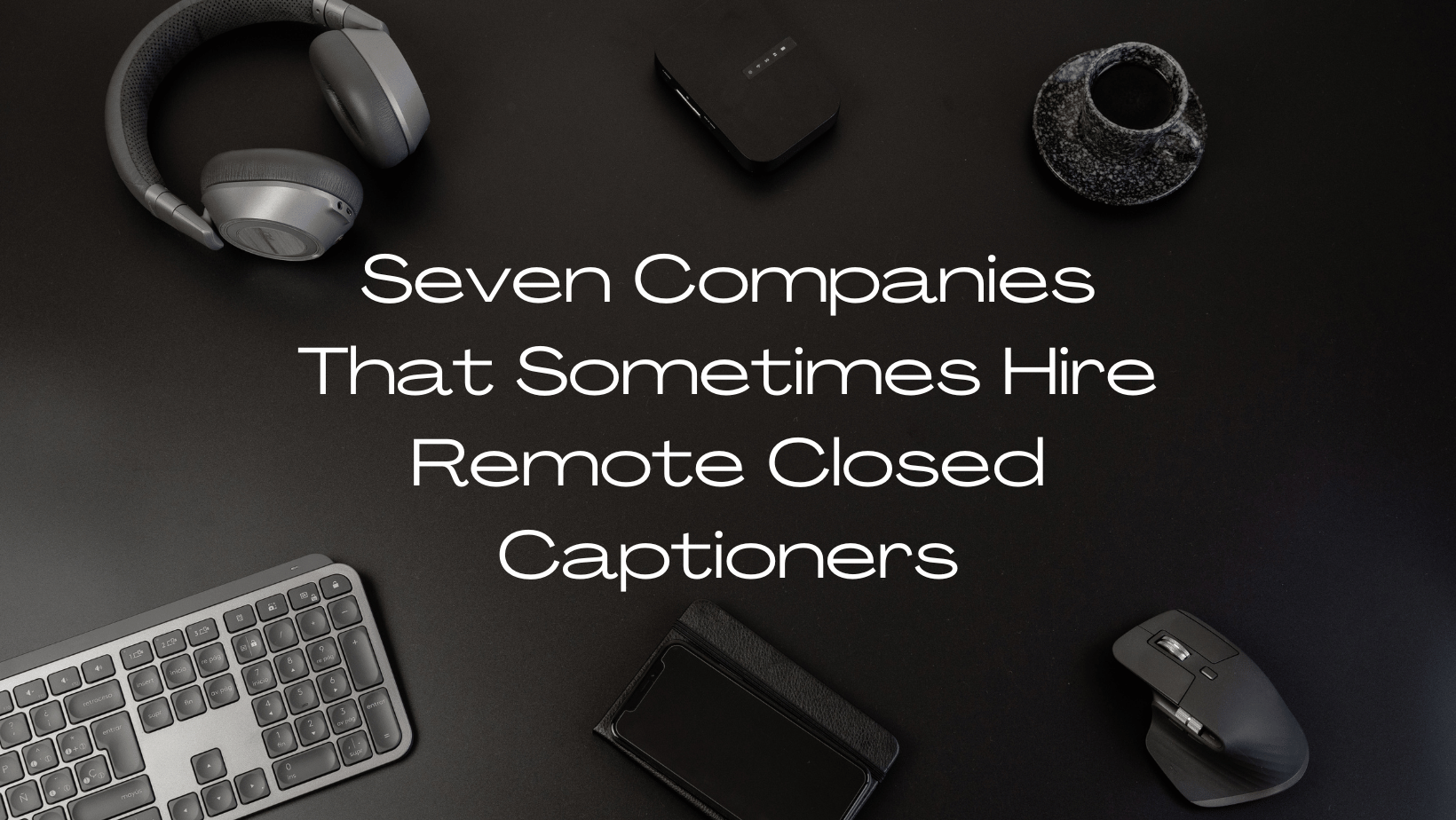Curious about closed captioning jobs? It's exactly as you might have guessed –creating the television and video captions for the hearing impaired.
While it may seem like something fairly easy to do, it's harder than you'd think and it's something that you can't really get into without some schooling. Still, it's an industry that can pay well and may also allow you the luxury of working from home!
Today I have a list of companies that hire for work from home closed captioning. Next to each company, I've tried to include some additional information.
If you're not familiar with how captioning works, you'll probably be surprised by the high words per minute requirements for each company. Captioning is generally done with a stenotype machine (something court reporters use) and if you are trained to use one, it is possible to type well over 200 words per minute.
Before we get to the companies, I want to break down for you the two different types of captioning. Below I've shared all the details.
Offline Closed Captioning
People who do offline closed captioning transcribe pre-recorded TV programming and/or movies (things that won't be airing live).
To be successful as an offline captioner, it's important that you type fast, have great English skills, are very comfortable using computers, and have a good understanding of time codes.
A time code is defined as, “A coded signal on videotape or film giving information about such things as frame number, time of recording, or exposure.”
Offline captioners may transcribe a program first (listen to it in it's entirety while preparing a script), and then use the script for captioning. Sometimes there will already be a script prepared for the transcriber to use.
Real-Time Captioning
Real-time captioning involves live programming. This is closed captioning for news broadcasts, sporting events, or anything taking place live.
As you can imagine, real-time captioning involves a great deal of speed and skill and because of this, it's known to pay far better than offline captioning does. In fact, some real-time captioners make upwards of $100K per year!
Just as it is with offline captioning, you'll need to be fast and accurate, and you'll also need to have stenographic skills because real-time captioners typically use stenographic shorthand while working.
To get into this line of work, you'll have to have been trained at a school that offers captioning courses. Many court reporting schools do offer degrees and certifications in captioning.
Companies That Occasionally Offer Closed Captioning Jobs
1 – Aberdeen
Aberdeen pays up to $75 per hour for real-time closed captioning from home (at-home positions not always open, it will be listed as at-home if so). You need to have experience in captioning with a speed of 180-220 words per minute.
Most of the captioning you do for them will require you to have some knowledge of Bible/Christian terminology.
Go here to check for openings at Aberdeen.
2 – Caption Media Group
Caption Media Group occasionally has openings for US-based closed captioners with a minimum of 2 years of experience.
They handle all kinds of captioning — everything from films to corporate materials. The company website does not appear to have a Careers page where you can check for openings, but you can sometimes find the listings on Indeed when they're hiring.
Go here to visit the Caption Media Group website. They don't have a “Careers” page, but it may be possible to contact them and ask if they are hiring.
3 – VIQ Solutions
This company has regular openings for at-home workers. The job description sounds more like transcription than captioning, but if you have an interest in transcribing entertainment and news broadcasts, this company may be an option.
They do require three past years of experience in transcription before they will consider you.
Go here to check for openings.
4 – Vitac
Vitac is one of the more well-known captioning companies. Many of their positions are in-house, but they do hire remote realtime captioners as well.
However, to qualify for a remote position you have to be trained and have experience in captioning. Another thing that's interesting about Vitac is that their captioners are employees of the company, not independent contractors. This is a little unusual because most of the captioning jobs I find are independent contractor positions.
Go here for more information on captioning jobs at Vitac.
5 – National Captioning Institute
NCI (National Captioning Institute) has regular openings for court reporters and voice writers with experience to work at home.
This company offers benefits (insurance, etc.) and paid training to their workers. To qualify, you must have at least an Undergrad degree, HS diploma plus three years related work experience, OR training/certification in court reporting or voice captioning.
Go here for more information on captioning work at NCI.
6 – Rev
This is one of the few companies that will hire beginners for closed captioning work. However, the pay is not great compared to what you would earn doing this for one of the other companies that insists on experienced and/or trained workers.
According to Rev, you will earn $0.40-$0.75 per video minute. Paid weekly, via PayPal.
Go here for more information on captioning jobs at Rev.
7 – CaptioningStar
If you are an experienced real-time captioner, you may be able to get freelance work with CaptioningStar. You can fill out the simple form on their website and wait to hear back.
Go here for more information on captioning jobs at CaptioningStar.
Where To Get Trained
If you don't already have the training and certification you need to qualify for the above jobs, you'll want to check out the National Court Reporting Association website (NCRA).
From what I've gathered, this is a good, reliable online resource for anyone wanting to break into the court reporting and captioning industries. You can find information there on schools and certification programs as well as employment opportunities.
Good luck to you!
Want to Know More About Work at Home Transcription and How to Get Started?
If you've read the above reasons for getting into transcription as a work at home career and you're thirsty for more information, I recommend Janet Shaugnessy's FREE transcription training workshop!
Janet has been in the transcription business for over 16 years now.
This explores how to build a business using your typing, writing, and editing skills.
You'll learn how much you can earn, where the work comes from, how to determine if you are cut out for it, and a lot more.
GO HERE TO CHECK IT OUT!

Anna Thurman is a work at home blogger and mom of two. She has been researching and reviewing remote jobs for over 13 years. Her findings are published weekly here at Real Ways to Earn.



National Captioning Institute hires real-time captioners (voice writers).
What is the best education for Captioning? How do I know if I want to do captioning or court reporting? Is there an affordable way to learn these skills? I’ve looked at the NACR website and it doesn’t really recommend schools. I don’t have $6K up front, but I do general transcription and I have a BS in education.
Any help is appreciated. I do want to train. Do I need a program or is it mostly about learning the steno machine and building speed? Any online resources for that?
Thanks!
DeAnne – If you can get on with someone like Rev, they will train you for offline captioning while you work. Once you’ve picked up the basics there, if you feel it’s something you’re interested in, then you’ll know which options to explore.
What is the going per minute rate for freelance offline captioning? I am new to freelance and have no idea what my rates should be?
Congrats!
Thanks Anna for sharing this information I had no idea that there was so many caption job opportunities out there. To be honest I didn’t even know that working from home doing caption even existed. This information was very informative thanks for sharing!
Finally a blog post that is somewhat correct and describes stenography properly. It makes me crazy that stenographers are categorized with transcriptionists. There is a big difference between the two because as you stated stenographers do not use keyboards. And you are correct the NCRA is where someone would need to go to find info on the industry, schooling, and also the different types of certifications needed in order to work. Depending on the type of work you want to do, certifications are needed in order to work in that specific field. For example, court reports(either working in an actual court or for an attorney doing depositions) have a specific certification required. However a captionist has a totally different one they need in order to caption. Then there is another certification for translators. Translators are usually hired by an agency or the state or fed gov or a private person to accompany a disabled person on their daily tasks. So its not a translator in the traditional sense where they are translating from one language to another. Many blind people utilize them for school or work purposes. What they actually do write(they don’t call it typing..stenographers write not type) all the conversation taking place for the disabled person since they are not able to either take notes themselves or may have a memory issue etc. So regardless of what area of stenography one chooses school and certification is required to work in the industry. If you choose not to get certified then the only work allowed is the same type of work transcribers do. The reason for this is because stenographers write in real time. Its impossible for a typist(even the fastest one in the world) to type as fast as they can write. Here are the certifications needed for the specific genre you want to work in. They are in order of difficulty. Everyone starts with the RPR. You have to get this for all work in the industry. From there people choose the specialty they want certified in. As you can see captioning is one of the harder ones to get. This is due to the realtime requirement being higher then others.
NCRA offers three main certifications:
RPR, Registered Professional Reporter
RMR, Registered Merit Reporter
RDR, Registered Diplomate Reporter
They have established seven other certification programs:
CRR, Certified Realtime Reporter
CBC, Certified Broadcast Captioner
CCP, Certified CART Provider
CLVS, Certified Legal Video Specialist
CRI, Certified Reporting Instructor
MCRI, Master Certified Reporting Instructor
CMRS, Certified Manager of Reporting Services
CPE, Certified Program Evaluator
Thanks so much for the additional information!
I noticed in some of the company descriptions you have to type about 200 wpm!! :-O And I thought I was fast when i broke 100. How do you learn to type that fast?
But as for your comment about nobody being able to type as fast as they can write…. I don’t know about that. I write so slowly that I prefer to type. Which is why my poor journal hasn’t seen much action. I can’t write fast enough to keep up with my thoughts, the way I can when I type! lol
I thought the same thing. How is it even possible to type over 200 wpm?
I believe they use special machines, like court reporters. That’s how. It’s not like a regular keyboard.
My guess is they meant CPM (characters per minute) which would translate to about 55-60 WPM.
It’s a machine that is used called a stenotype machine. It’s used much like a piano in that multiple keys are pressed at a time. Unlike a typewriter, this machine enables the user to write words and phrases at a time instead of spelling everything out one word at a time. That is where the term writing, as opposed to typing, comes from.
To be able to use this machine you must learn machine shorthand. This is referred to as theory. NCRA can assist with this info as there are many to choose from.